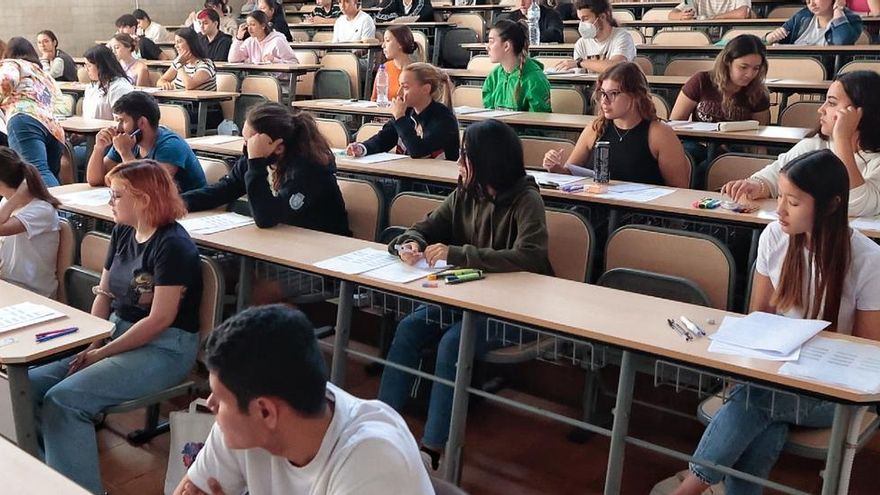
Five groups of Canarian students from centers in Tenerife, Gran Canaria and Lanzarote took various exams the new EBAU in a pilot test launched by the Ministry of Education and Vocational Training. This initiative was carried out in fifty centers throughout Spain, with the exception of the autonomous communities governed by the Popular Party, Aragon and the Basque Country. In the Archipelago, the exams were Philosophy and Artistic Drawing in the 1st year of Baccalaureate classes at the IES La Laboral and IES Los Cristianos, in Tenerife, the IES Pérez Galdós and the School of Art and Superior Design, in Gran Canaria, and the Pancho Lasso School of Art in Lanzarote. The subjects in which the students were examined were different in each territory.
He Ministry of Education organized this pilot test to “harmonize the university entrance tests, which will begin to be implemented gradually in June 2024, with the competency-based nature of the new curriculum”. However, the university entrance exams to be carried out this year, both the ordinary ones in June and the extraordinary ones in July, will be identical to those that have been carried out in recent years. It has been decided to carry out the pilot test in the 1st Baccalaureate groups since in the 2nd year, where the students who will take the EBAU this year are located, the new Education Law, the Lomloe, has not yet been implemented, in which includes this new model of the university entrance exam. This pilot test will make it possible to analyze the degree of adaptation of the students to this type of competency test, the time established for the exercises, the comparison between the different possible models of exercises developed and the reliability of the correction, among other aspects. Next, the analysis of this piloting will allow decisions to be made regarding the definitive test model of each subject that will be carried out in the 2nd Baccalaureate from 2024. The forecast of the Ministry is that these analyzes will be ready in May and will be taken into account for Prepare the test models for all subjects in the 2nd year of Baccalaureate, which will be available in June, one year before the first entrance tests are held with the new system.
He IES La Labor It is one of the centers in the Canary Islands where these tests were carried out. Nearly thirty students from the Baccalaureate of Arts took the tests that, in addition to having a much more competency-based approach, as defended by the new Education law, lasted longer than those carried out up to now to access the university. Precisely, one of the latest details that the Ministry of Education has advanced regarding the reform of the EBAU is that the duration of each of the exams will become 105 minutes, instead of the current 90, and this has already been noted in the two exams that were carried out in centers such as the lagoon, and that lasted at least one hour and 45 minutes. Precisely this increase in exam time is also due to the fact that the tests have more questions.
The director of the lagoon center, Fernando Gonzalez, explained after the end of the school day that despite the fact that these exams had been a surprise for the students, “they left happy” due to the substantial change in the test methodology. Thus, the teacher indicated that these tests show the great modification that the entry into force of the new educational law implies and that the changes will gradually be noticed in the classroom and then be reflected in the university entrance exams. “Now we will be able to continue implementing the changes after seeing what the proposed exams are like,” reflected the director. After completing the two exams, the students also completed a survey in which they were able to express their opinion on these new tests.
The territorial director of Education of the province of Santa Cruz de Tenerife of the Government of the Canary Islands, Federico Delgado, highlighted the importance of carrying out these pilot exams to be able to establish the new university entrance exam with guarantees. “Depending on the conclusions reached with the results, it will be possible to have a solid criterion to know if the change has to be carried out gradually or in one go, for example,” he reflected.
The change
The modification of the EBAU is generating some conflicts between different sectors, which do not see some of the decisions taken by the Ministry of Education as correct, which in fact has been forced to delay the implementation of the new model until June 2028 in the absence of consensus. Despite this, Pilar Alegría’s department defends the need to establish a new university entrance test since Lomloe has brought with it a new arrangement of the Baccalaureate, with new modalities, as well as new curricula with a competence approach that will imply use other methodologies and another way of evaluating.
Until reaching 2028 and starting next year, the Ministry of Education proposes a transitory model with exams lasting 105 minutes, in which all the exercises will be weighted equally; the final mark of the access phase will be calculated with 60% of the mark of the Baccalaureate record and 40% of the average mark of the four or five exercises carried out in the access phase and, in addition, there will be the option of going up note to reach 14 points.
















